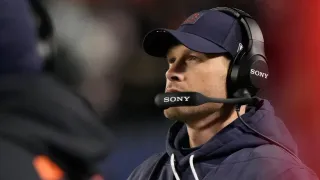August 12, 2024
EDGE Interview: 'Drag Race' Alum Dusty Ray Bottoms Explains Surviving Conversion Therapy in New Doc
Steve Duffy READ TIME: 10 MIN.
EDGE: Has it helped heal you?
Dusty Ray Bottoms: It has, for sure. One thing that is hard about this process is that we've been working on this documentary for six years. I was the first interviewee for this documentary, [and] even though I started sharing my story six years ago, it is great now that more people will hear it. Hopefully, a lot of parents who see this will say, "Maybe I won't do that," or a kid who sees it thinks, "I will steer clear of that and know that I'm not alone." There is power in being able to be your true authentic self, but it's honestly just a wild ride, and I'm very proud of it.
EDGE: Do you still hold any space for religion or spirituality?
Dusty Ray Bottoms: One thing that I've always found so mind-boggling about Christianity is something that I've always heard: Your relationship with Christ is personal. If it's so personal, why is everyone always sticking their nose into my relationship?
I don't believe in an American Jesus or an American God. I think it is a wild, fabricated thing. I believe a higher power exists, and everything happens for a reason, and whatever you put in the universe will come right back to you. I firmly believe in that, and if that is God, Jesus, or whoever, that is awesome.
Also, I don't want to detour any queer person to not believe in Jesus, God, or any spirituality. I think it's incredibly important that if it is working for you and you believe in it, you need to hold on to it. Just because I don't believe doesn't mean others shouldn't.
EDGE: In the film, you say that your parents still think that being gay is a choice. Has your relationship with them improved at all?
Dusty Ray Bottoms: Our relationship has improved greatly. I love my mom and dad. I have always loved my mom and dad. Some people think that speaking about this is going against them. When you watch the film from start to finish, you can see that there is a lot of love and hope in the film. I think that my parents were misled by the church, and it's unfortunate. It happened, and we've moved past it. I hope the viewers can see it for themselves.
EDGE: How have you learned to love and accept yourself through all of this?
Dusty Ray Bottoms: Well, first and foremost, I had to put a lot of distance between myself and the problem, and the fuel feeding the issue of being unable to love and accept myself. When I moved to New York – a very queer city – I was surrounded by a lot of accepting people and allies, and through trial and error and a lot of therapy, I was able to make it happen.
It was not easy. There are still times, as a 36-year-old, that I still get triggered, and I get down on myself over my past. There's a little bit of Christian guilt that creeps in and takes control of my thoughts – for example, "Maybe I shouldn't be holding my husband's hand right in public." My healing is always going to be a work in process. I am very happy with my relationship with myself today, and I appreciate myself. I couldn't do that while I was going through conversion therapy.
EDGE: What was your first exposure to the world of drag?
Dusty Ray Bottoms: First, I watched "Mrs. Doubtfire" and "To Wong Foo" on television. My first experience of seeing it in person was when I was about 18, and I went to Connection Nightclub in Louisville. When I saw those showgirls on stage, I was just in awe of them and scared of them because I didn't understand them. I also thought there would never be a place for me on that stage because they were so glamorous, beautiful, and perfect, and the showmanship was just amazing.
When I moved to New York City, I wanted to be an actor, be on Broadway, and do TV and film, but obviously, it didn't go as planned. After seeing a drag queen named Georgie perform in the West Village, I thought I could have a voice in this world. I'm not a pageant girl, but I'm a theater funny girl, and I could do it. It felt awesome once I put on my wig and heels, and then once I was taken seriously and found my people, I was truly happy.
EDGE: From conversion therapy to wigs and heels, and then on Season 10 of "RuPaul's Drag Race." What an experience! Tell us about it.
Dusty Ray Bottoms: It is just wild and an absolute dream come true. During my conversion therapy, I was told that I would never find love, happiness, or success if I continued with this lifestyle, and that I would have a miserable life. Finding and loving myself has allowed me to let myself shine. I've been able to experience so many wonderful opportunities because I've been able to shine and love myself.
Being successful in getting on "Drag Race" was a dream I thought would never come true. I have been putting on my wigs and heels for almost 12 years now, and I love it even more than when I started.
I just finished a professional production of "The Rocky Horror Picture Show" in Covington, Kentucky, which was amazing and beautiful. The show broke box office records for the theater, and they're bringing it back next year, so I'll get to do it again.
Things are so wild and happening, and I am living out my dream. I have a husband and two dogs. I couldn't be happier and more grateful for that. What makes it even sweeter is that I was told none of this would ever happen.
EDGE: For many, "Conversion" is a film about survival and hope. What has this film meant to you?
Dusty Ray Bottoms: I wish that I had a film like this to watch as a young queer person. The film showcases people of all age ranges who went through conversion therapy. Zach's happened during his childhood and teenage years. Mine happened in my twenties, and Elena was in her thirties. You get three very clear stories and timelines, and see that it can happen to anyone.
If I could have just seen that as a kid, to know that this isn't real and not to do it because I am perfect just the way that I am would have made a world of difference, and I probably would've lived a little louder. What is great about our film is that the leader of the movement is part of the story. You hear his story directly from him. For the non-queer viewers, I want them to walk away and think, "Wow, how can I help make changes."
"Conversion" is available now on VOD.






